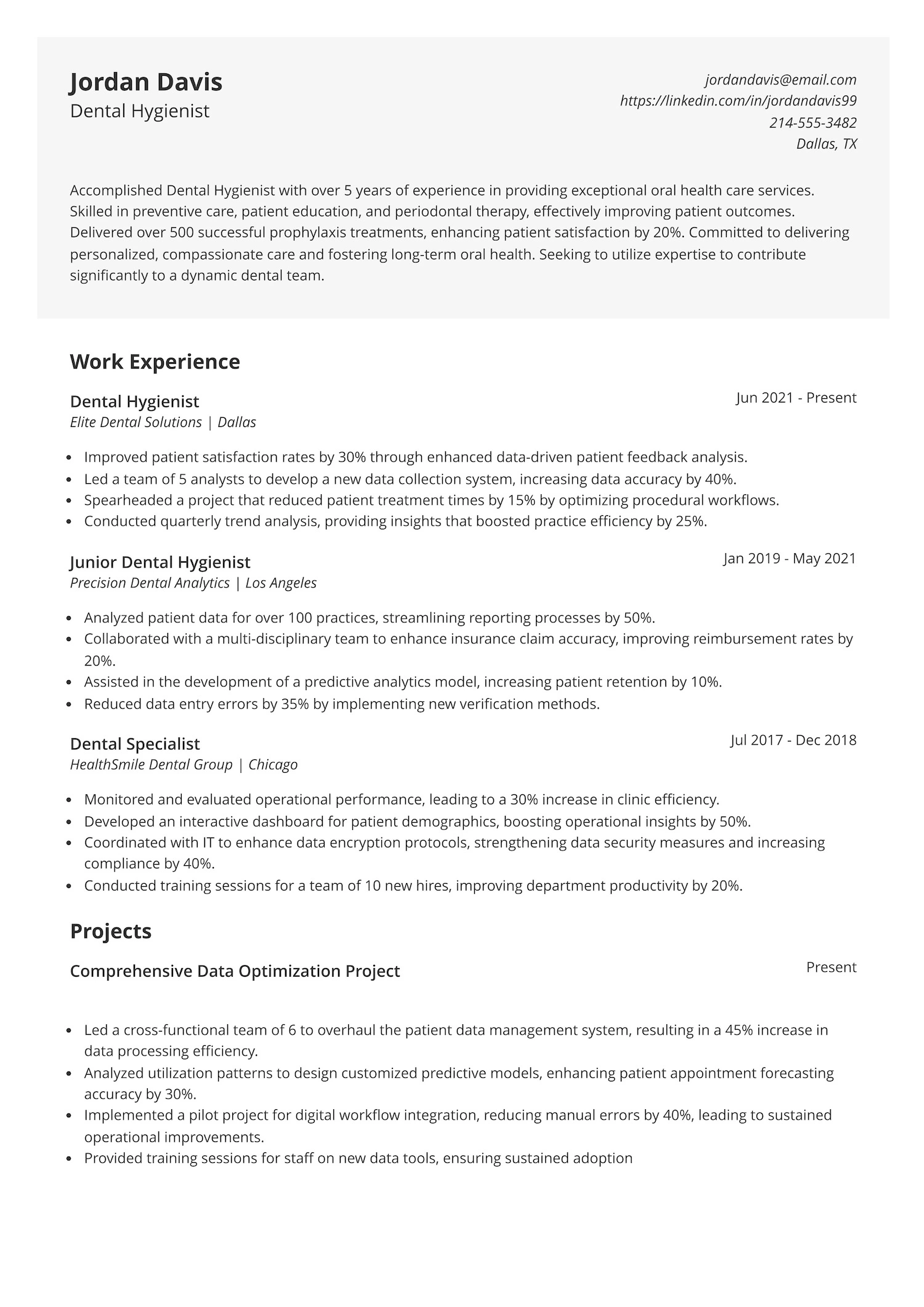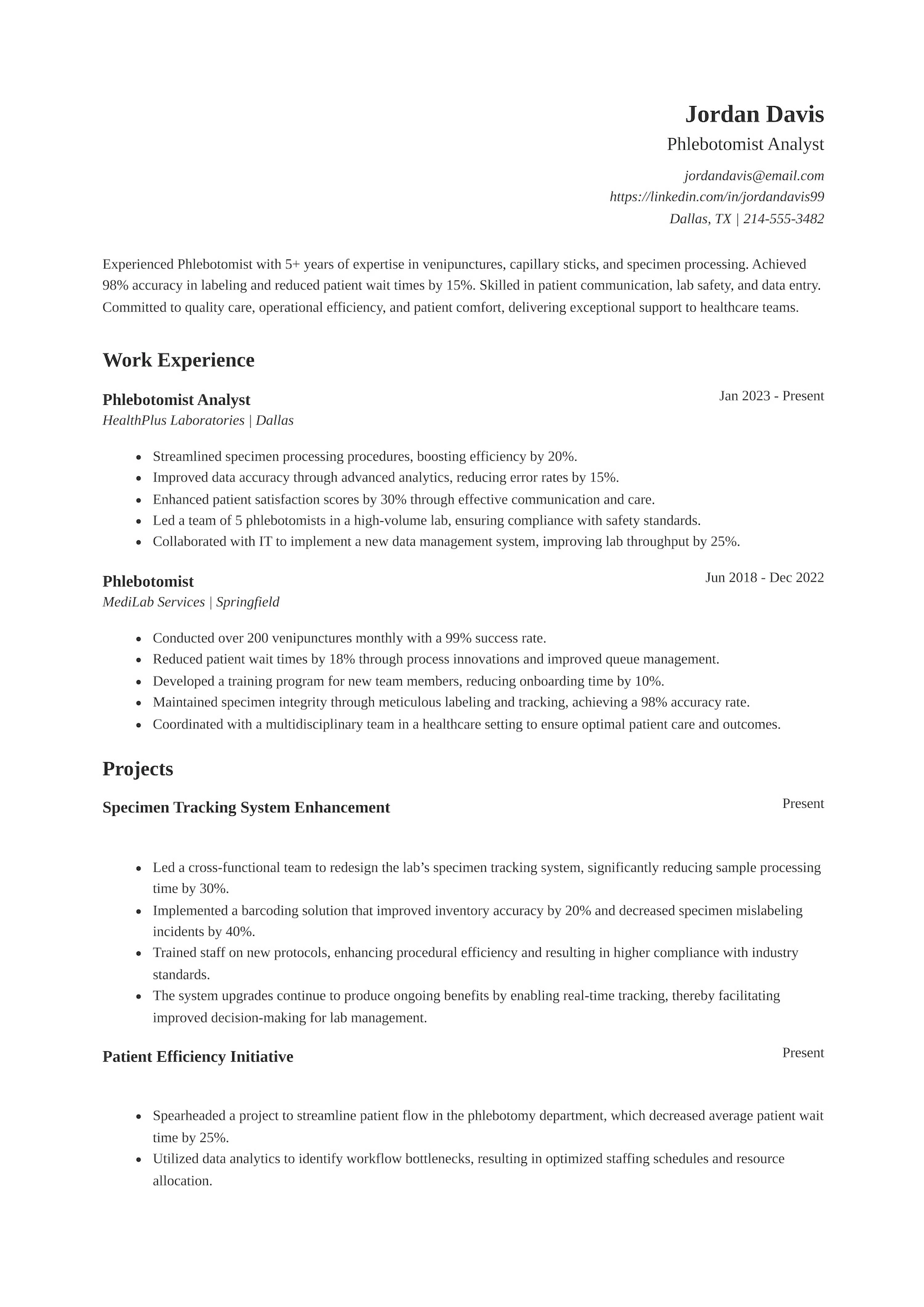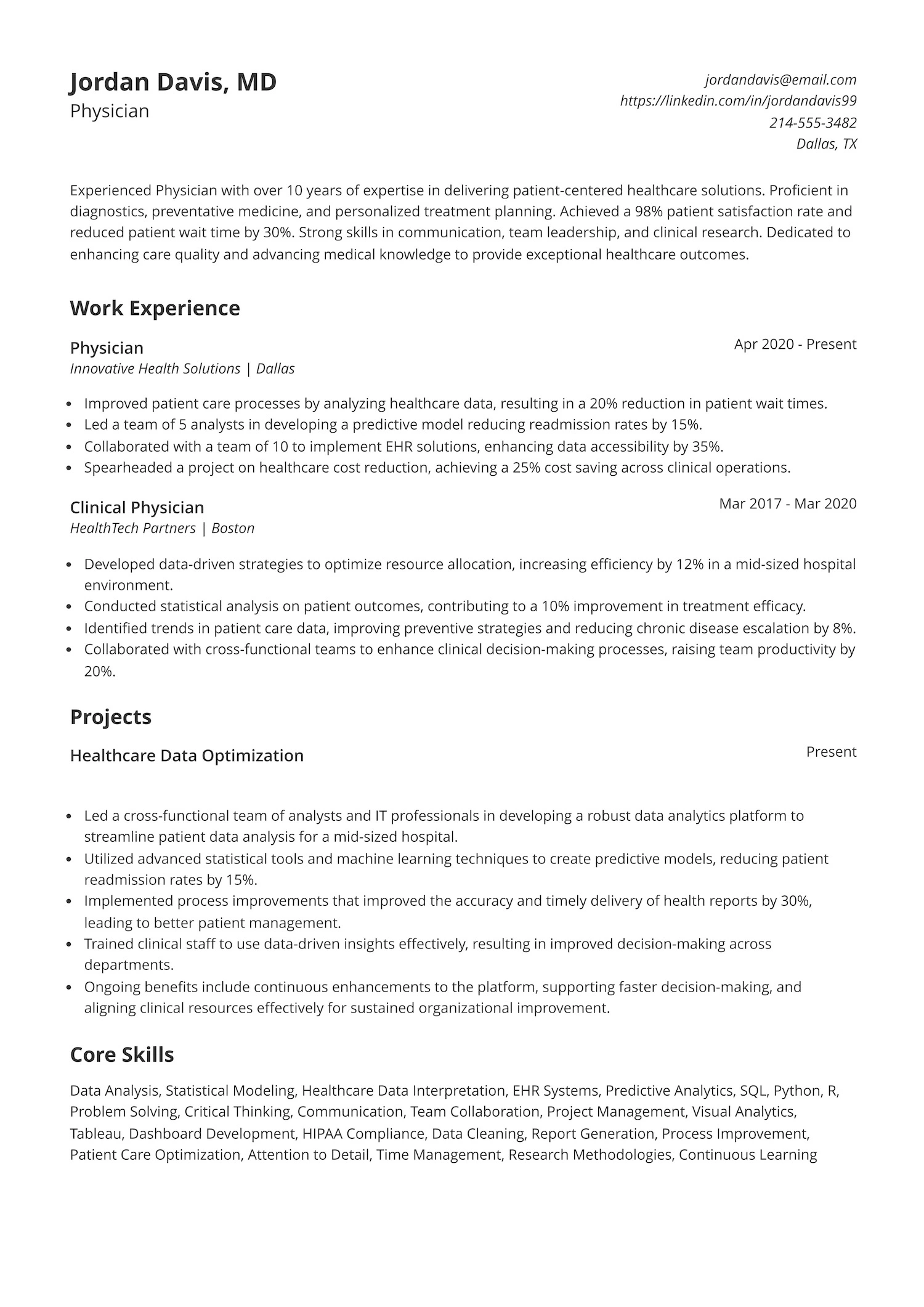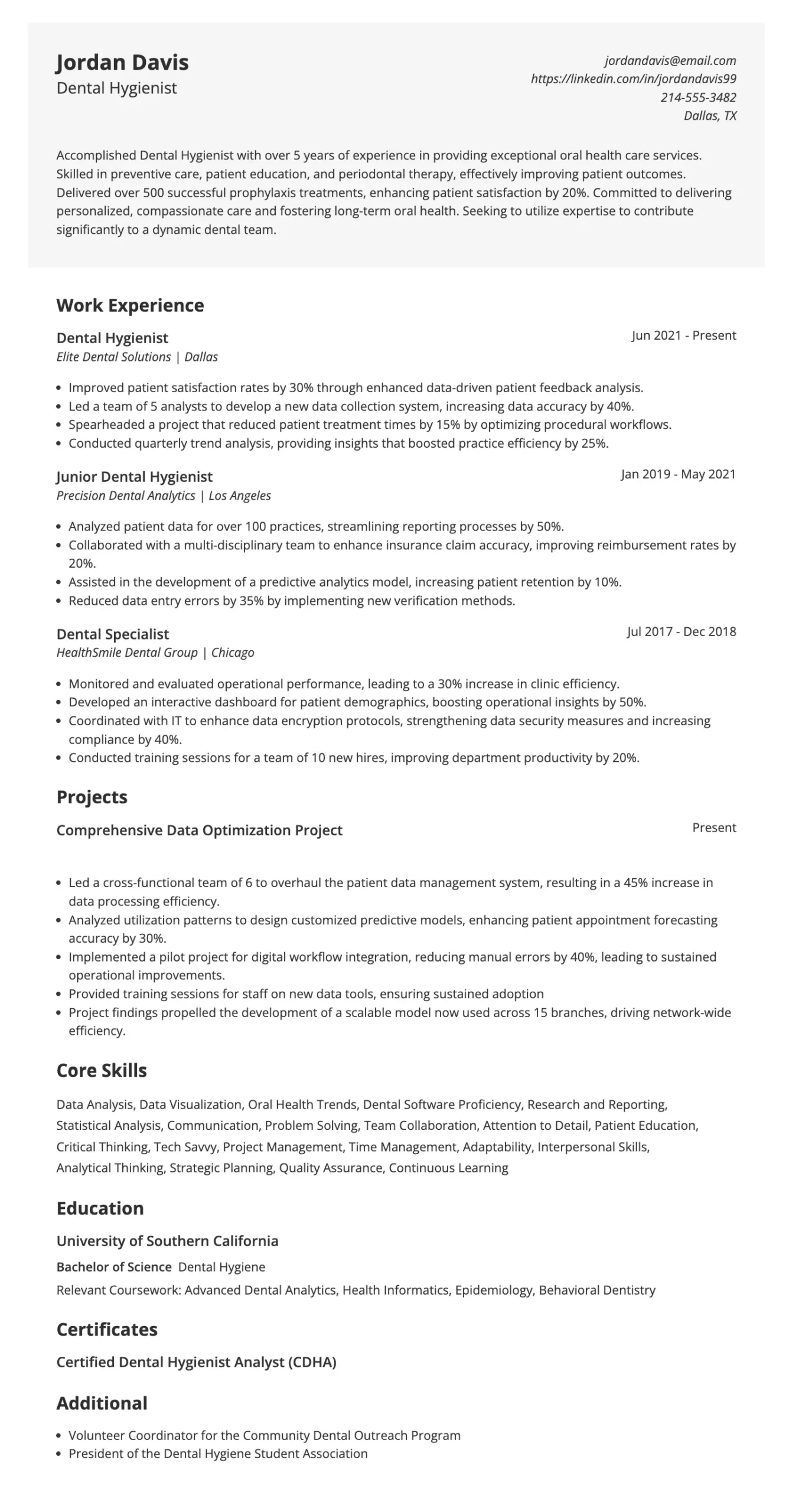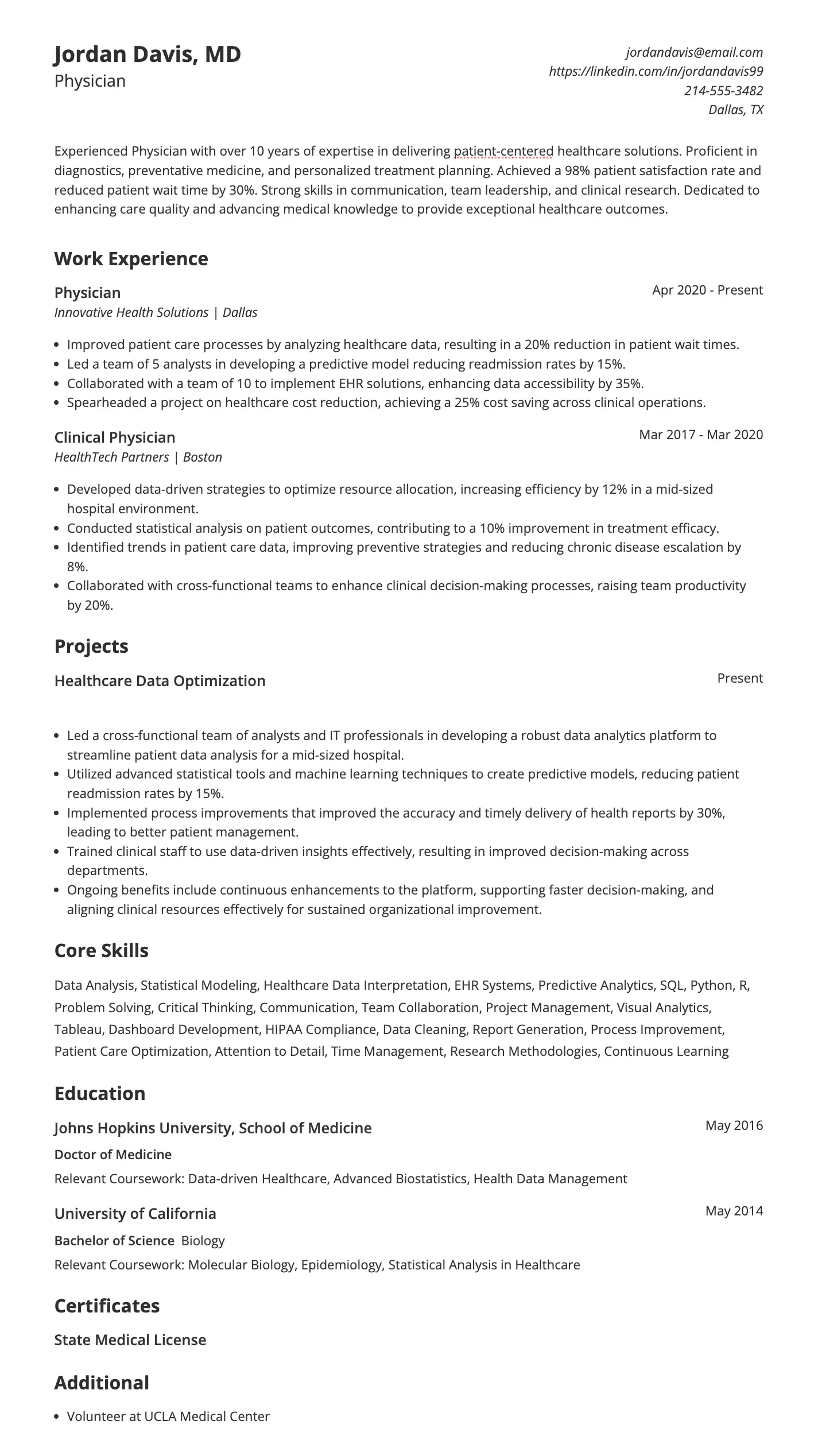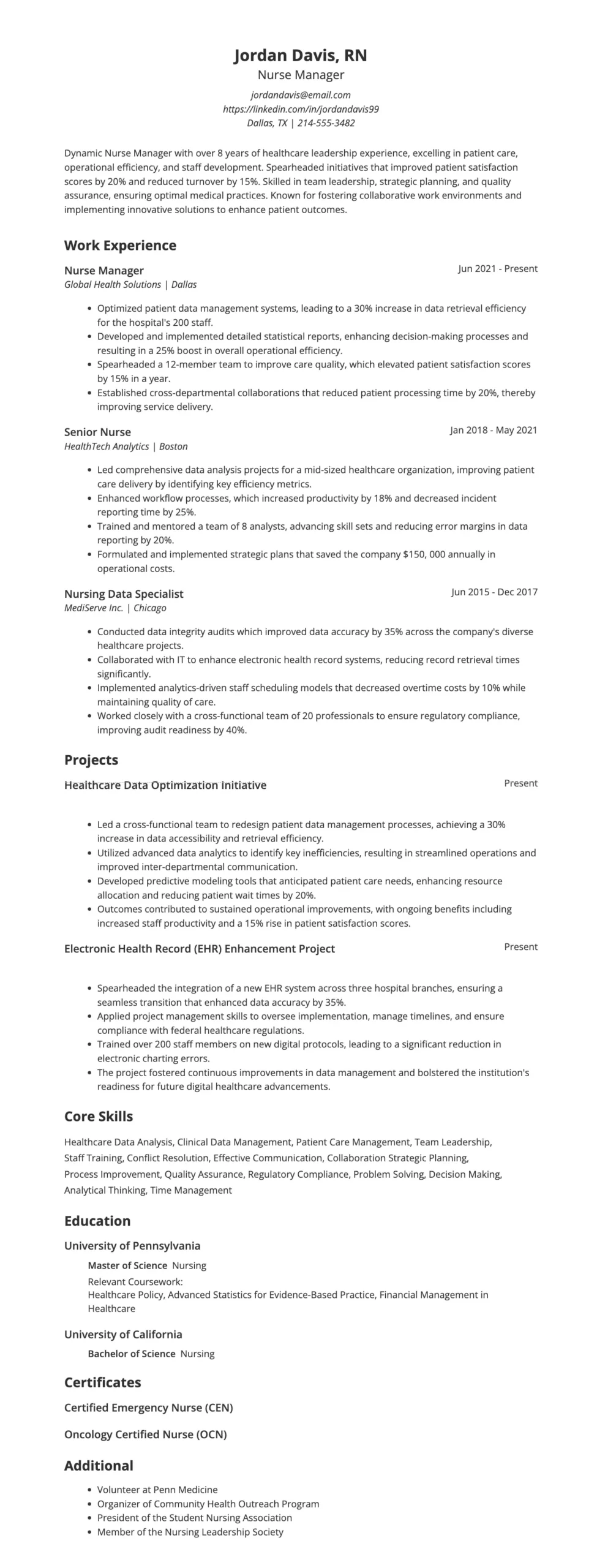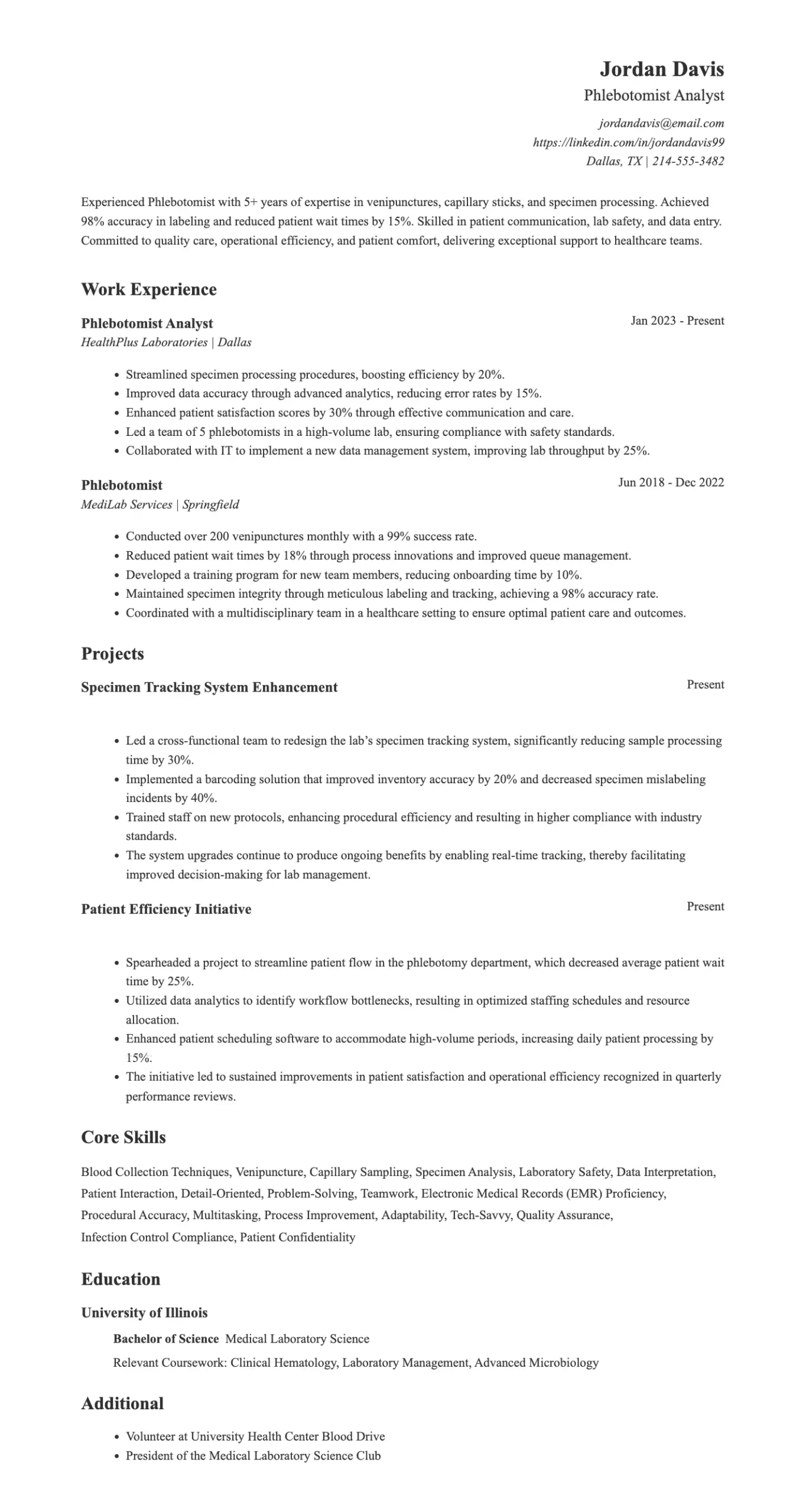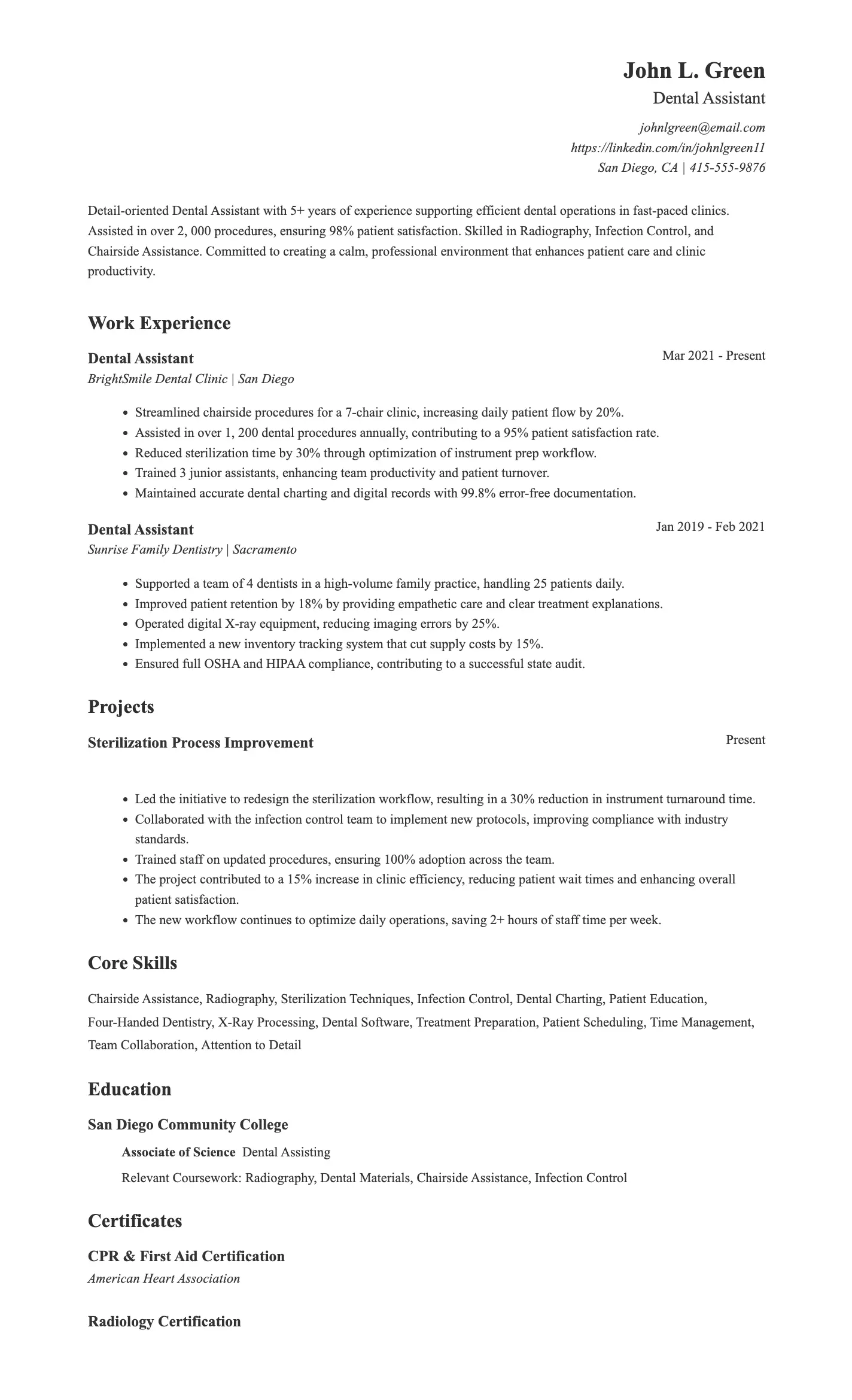Healthcare Resume Examples & Tips for 2025
Struggling to get noticed in a competitive field? Check out our healthcare resume examples for 2025 that show exactly what recruiters want to see.

July 15, 2025

The healthcare industry continues to thrive in 2025, offering countless opportunities for passionate professionals across a wide range of roles—from patient care to healthcare administration. But with growing competition, landing your ideal role starts with one essential tool: a solid healthcare resume.
Whether you’re a seasoned nurse, a dental hygienist, or new to the healthcare field, your resume must highlight relevant skills, years of experience, and meet today’s applicant tracking system (ATS) standards.
In this guide, we’ll guide you through standout healthcare resume examples, explain what to include in your skills section and experience section, and show you how to tailor your resume to impress hiring managers. Let’s simplify your job search!
Dental hygienist resume example
Wondering how to make your dental hygiene experience stand out on paper? Check out this resume example. It is a great place to start. If you’re in the same field, take inspiration from the way this resume highlights results, teamwork, and innovation.
As a dental hygienist, you need analytical thinking, workflow optimization, and tech fluency. Your resume should show experience with patient data, process improvements, and team collaboration. Employers want candidates who can boost patient satisfaction and efficiency through smart, data-informed strategies, just like this resume clearly demonstrates.
Blending clinical expertise with data analytics, this resume showcases a unique mix of hands-on dental care and performance-driven results. With over 500 successful treatments, project leadership experience, and a proven track record in improving satisfaction, efficiency, and accuracy, it demonstrates exactly what modern dental practices need.
From patient-focused care to optimizing workflows across multiple branches, it positions the candidate as both a skilled practitioner and a valuable strategic asset.
Physician resume example
Looking to land your next role in healthcare data or clinical analysis? Wondering how to showcase both your medical background and tech-savvy skills? Take a look at the resume template below—it strikes the right balance between clinical experience and data-driven problem-solving. If you’re unsure how to present your healthcare analytics background clearly, this sample can offer real inspiration.
For a physician analyst role, your resume should highlight both medical expertise and technical ability—think predictive analytics, EHR systems, and collaborative project work. Employers expect candidates who can bridge patient care with operational efficiency. This resume does just that, with real numbers and achievements that show impact.
Merging clinical experience with strong data expertise, this resume highlights a well-rounded candidate who brings over a decade of medical practice and analytics leadership. With advanced degrees from top institutions like Johns Hopkins and UCLA, the education section reinforces a solid academic foundation in health informatics and biology.
The work experience and project achievements show real impact—reduced readmission rates, improved patient outcomes, and cost-saving initiatives. It’s a powerful example of how a physician can drive both care quality and operational efficiency.
Nurse manager resume example
Feeling stuck trying to write your resume as a nurse manager? You’re not alone—many healthcare professionals wonder how to show off leadership, technical skills, and patient care expertise all in one document. That’s why we have put together this nurse manager resume example. Use it as inspiration or a starting point for building your own standout resume.
This role calls for someone who can lead teams, improve care delivery, and handle data-driven decision-making. Employers want to see your impact—like process improvements, staff development, and patient satisfaction results. Your resume should reflect that with specific achievements and real numbers.
With clear metrics and detailed achievements, this resume showcases strong leadership in healthcare operations. It highlights success in boosting patient satisfaction by 20%, improving data systems, and managing large teams. The projects reflect hands-on experience with EHR implementation and data optimization, key for modern healthcare roles.
Combined with advanced education, certifications, and consistent career growth, the resume positions the candidate as a results-driven leader ready to make impactful decisions.
Phlebotomist resume example
Not sure how to highlight your phlebotomy skills and experience on a resume? Take a look at the example below—it’s a great reference for showcasing technical skills, achievements, and impact. Whether you’re just getting started or have years under your belt, this resume can help you shape your own.
Phlebotomy roles call for precision, efficiency, and strong patient communication. Your resume should show your ability to handle specimens accurately, follow safety protocols, and improve lab workflows. Employers want to see measurable results, leadership in lab settings, and a commitment to patient care—all of which this example gets right.
By blending strong technical skills with measurable achievements, this resume paints a clear picture of a phlebotomist who adds real value to healthcare teams. From leading efficiency projects that cut wait times by 25% to achieving a 99% venipuncture success rate, it reflects both clinical expertise and process improvement.
The inclusion of leadership roles, team training, and EMR proficiency positions the candidate as a dependable, well-rounded professional prepared for fast-paced environments where precision, care, and collaboration are essential.
CNA resume example
Looking for a job as a Certified Nursing Assistant but not sure how to make your resume stand out? This resume example showcases a strong professional summary, measurable achievements, and key skills that can help you land your next CNA role.
A CNA role requires more than just patient care—it calls for additional skills like leadership, efficiency, and attention to detail. Employers expect candidates who can manage patient safety, support medical teams, manage medication, provide geriatric care, acute care, and enhance care quality. A well-structured resume with quantifiable results can prove you’re the right fit.
This resume template uses strong action verbs like “supervised,” “enhanced,” and “implemented” to highlight leadership and initiative. Employers will appreciate the clear structure and detailed responsibilities, making it easy to see the candidate’s impact. For a senior CNA, this resume effectively demonstrates expertise, leadership, and a commitment to quality care.
Also Read: How to Organize Your Resume Sections to Stand Out?
Dental assistant resume example
Are you a skilled dental assistant looking to advance your career? This dental assistant resume example shows exactly how to write a strong application and highlight your experience to stand out to employers.
The role calls for a detail-oriented professional with expertise in radiography, infection control, and chairside assistance. You’ll need to demonstrate strong time management, teamwork, and a commitment to high-quality care to meet the expectations of any dental practice.
This resume template works because it effectively highlights key skills and achievements using strong action verbs like “streamlined,” “reduced,” and “improved.” The work experience section includes specific metrics, such as increasing patient flow by 20% and reducing sterilization time by 30%, which clearly shows the impact made. Employers will appreciate the measurable results and focus on efficiency, patient care, and teamwork. This resume appeals because it demonstrates both expertise and tangible contributions to clinic success.
Esthetician resume example
If you’re aiming for an esthetician role, you need a resume that reflects your expertise, leadership, and ability to drive client satisfaction. Whether you’re advancing in your career or seeking a new opportunity, our senior esthetician resume example will help you highlight your advanced skincare skills, client retention strategies, and business impact.
Estheticians are expected to be proficient in advanced skincare treatments, client consultations, and team leadership. The role demands expertise in analyzing skin conditions, personalizing treatment plans, and staying ahead of industry trends. Candidates should showcase their ability to enhance customer experience, boost sales, and train junior estheticians, proving they can contribute to both client wellness and business growth.
This esthetician resume showcases expertise in advanced skincare treatments and a strong track record of client retention and business growth. The Skincare Analytics Optimization Project highlights data-driven decision-making, improving efficiency and boosting sales.
Further, the candidate’s recognition on the Dean’s List and membership in the National Society of Leadership and Success demonstrate academic excellence and leadership. With certifications in Body Contouring, Brow Lamination, and Laser Hair Removal, it reflects well-rounded industry expertise.
How to write a healthcare resume that will get you an interview
In a competitive field like healthcare, writing a resume that grabs attention—and gets past Applicant Tracking Systems (ATS)—is essential. Most healthcare organizations now rely on ATS to streamline the application process and organize candidates. If your resume isn’t optimized for these systems, it may never even reach a hiring manager’s desk. Understanding how ATS works can help you create a resume that highlights your core competencies, job duties, and work experience effectively.
Here’s how ATS works, step-by-step:
- Job posting setup: Recruiters input details like job titles, required technical skills, and qualifications into the ATS based on the job description.
- Resume scanning: The ATS scans every resume for relevant keywords that match the job posting.
- Searchable database: All resumes are stored in a searchable database. Recruiters then search the database using keywords related to healthcare jobs, such as “patient care,” “home health aide,” or “basic life support.” Only resumes that include those keywords appear in search results; others remain hidden.
To simplify the process of resume writing, consider using Jobscan’s Free Resume Builder—a powerful tool designed to help job seekers write ATS-friendly resumes. It uses proven formatting, highlights key skills sections, and automatically integrates keywords tailored to your job posting. With Jobscan’s Resume Builder, you can stop second-guessing your resume writing and start getting noticed by potential employers in the healthcare industry.
Optimize your resume
Use Jobscan's resume scanner to ensure your healthcare resume is ATS-friendly and includes all the necessary keywords from the job description.
Scan your resume
Key elements of a healthcare resume
Whether you’re applying to a hospital, clinic, or private practice, including the right elements in your resume ensures it’s both ATS-friendly and appealing to hiring managers. Below are the key components every healthcare professional should include:
- Contact information: Include your full name, phone number, email address, and LinkedIn profile. Make sure everything is up to date and easy to find at the top of the page.
- Professional summary: A brief 2–3 sentence introduction summarizing your years of experience, specialties, and what makes you a strong candidate in the healthcare field.
- Core skills: List your relevant technical skills and soft skills, such as patient care, time management, electronic health records (EHR), or healthcare administration.
- Work experience: Detail your previous roles in reverse chronological order, including job title, healthcare organization name, and key responsibilities or achievements.
- Projects: Highlight any specific healthcare-related projects or initiatives you led or contributed to, especially those that improved patient outcomes or streamlined operations.
- Education: Include your degrees, such as a Bachelor of Science in Nursing or Healthcare Management, along with the institution’s name and graduation year.
- Certifications: List certifications relevant to healthcare, such as Basic Life Support (BLS), CPR, or credentials from the American Heart Association or American Red Cross.
- Honors and awards: Mention any professional recognitions, such as Employee of the Month, academic honors, or industry-specific awards that demonstrate excellence in your field.
Write a strong professional summary
A strong professional summary sets the tone for your entire healthcare resume. It should quickly convey your experience, core competencies, and what you bring to the table. A well-written summary captures the hiring manager’s attention and helps your resume stand out in both ATS scans and human reviews.
Good examples of a resume summary
- “Compassionate and detail-oriented Registered Nurse with 7+ years of experience in acute care settings. Skilled in patient care management, electronic health records (EHR), and time-sensitive decision-making in fast-paced environments. Proven track record of improving patient satisfaction scores and streamlining care coordination.”
- “Certified Home Health Aide with 4 years of experience providing high-quality personal care to elderly and disabled patients in residential settings. Proficient in basic life support, mobility assistance, and maintaining detailed care records. Recognized for building strong patient relationships and supporting individualized care plans.”
Bad examples of a resume summary
- “I am a hard worker looking for a job in healthcare. I like helping people and want to learn more.”
- “Healthcare worker with experience. Good at multitasking and working under pressure.”
To make sure your professional summary is optimized for both ATS and hiring managers, try Jobscan’s Summary Generator. It helps you write a personalized, keyword-rich summary that aligns with the job posting, giving you a strong start at the top of the page.
Demonstrate key healthcare skills
To stand out in the competitive healthcare job market, it’s crucial to showcase a balanced mix of hard and soft skills. Hard skills demonstrate your technical expertise and qualifications, while soft skills highlight your ability to connect with patients, work in teams, and manage stressful situations. Be sure to include these in your skills section and naturally throughout your work experience section.
Hard skills for healthcare
- Patient Care Management
- Electronic Health Records (EHR)
- Basic Life Support (BLS)
- Medication Administration
- Vital Signs Monitoring
- Infection Control Procedures
- Diagnostic Testing
- Wound Care
- Medical Terminology
- Healthcare Software Proficiency
Soft skills for healthcare
- Time Management
- Communication and Empathy
- Attention to Detail
- Problem-Solving
- Team Collaboration
- Adaptability
- Conflict Resolution
- Organizational Skills
- Ethical Decision-Making
- Stress Management
Incorporating healthcare skills into your bullet points allows you to effectively showcase your expertise and achievements. Here are some good and bad examples to inspire you to write compelling bullet points that make your resume stand out.
Write impactful resume bullet points for healthcare
Resume bullet points are the core of your experience section. They should clearly communicate your skills, the impact you’ve made, and the value you bring to a team. Instead of listing tasks, focus on what you accomplished using specific tools, action verbs, and measurable results. Here’s what that looks like:
Good examples of resume bullet points
- “Administered medications and monitored patient responses, contributing to a 15% improvement in recovery times.”
- “Collaborated with a multidisciplinary team to implement new patient care protocols, enhancing workflow efficiency by 20%.”
- “Maintained accurate electronic health records (EHR) for over 50 patients weekly, ensuring compliance with HIPAA regulations.”
Bad examples of resume bullet points
- “Helped patients with stuff.”
- “Worked with a team and did many things in the hospital.”
- “Took care of records and patient things.”
Vague and generic bullet points can weaken your resume, making it harder for hiring managers and ATS to recognize your value. To write clear, impactful, and keyword-rich accomplishments, try Jobscan’s Bullet Point Generator—a smart tool that helps you create results-driven bullet points tailored to your healthcare experience and target job.
Highlight your achievements as a healthcare provider
Hiring managers and recruiters want more than just a list of job duties—they’re looking for measurable achievements that show the impact you’ve made in past roles. Highlighting your accomplishments proves you can deliver real results in a healthcare setting. Use numbers, percentages, or specific outcomes to bring your success stories to life.
Here are some strong examples:
- “Reduced patient discharge time by 25% by streamlining documentation and coordination with case management.”
- “Recognized with “Employee of the Quarter” award for excellence in patient care and communication.”
- “Spearheaded a health education program that increased patient compliance with treatment plans by 40%.”
- “Successfully trained 10+ new hires on EHR systems and hospital protocols, boosting team efficiency.”
Tailor your resume to the job description
Customizing your resume for each job application helps you align with what the employer is specifically looking for—and increases your chances of being seen.
Here’s how you can tailor your resume to the job description:
- Identify key skills and qualifications listed in the job description.
- Use the same terminology and keywords throughout your resume, especially in the skills section and work experience section.
- Match your job titles (if applicable) to similar roles mentioned in the posting.
- Highlight achievements that align with the employer’s priorities (e.g., patient care, time management, EHR proficiency).
- Reorder bullet points to showcase the most relevant experience first.
- Adjust your professional summary to reflect the role’s key responsibilities.
- Mirror the tone and language of the job posting to show alignment with the organization’s culture.
Include relevant education & certifications
Your education and certifications validate your qualifications and signal to potential employers that you meet industry standards. In the healthcare field, certain credentials are often non-negotiable, and including them can strengthen your resume.
Here’s how to include relevant education and certifications in your resume:
- List your degrees in reverse chronological order.
- Include the full name of the institution, graduation date (or expected date), and location.
- Add certifications under a dedicated “Certifications” section or below your education.
- Include the full certification name, issuing organization, and expiration date if applicable.
- Only list certifications that are current and relevant to the job posting.
Top healthcare certifications
Earning industry certifications can set you apart and enhance your resume:
- Basic Life Support (BLS)
- Advanced Cardiovascular Life Support (ACLS)
- Certified Nursing Assistant (CNA)
- Registered Nurse (RN) License
- CPR Certification (American Heart Association or American Red Cross)
- Pediatric Advanced Life Support (PALS)
- Certified Medical Assistant (CMA)
- Home Health Aide (HHA) Certification
- Electronic Health Records (EHR) Certification
- Certified Phlebotomy Technician (CPT)
Healthcare resume tips
To land a healthcare role, your resume must be clear, concise, and results-driven. Follow these expert tips to create a compelling resume that grabs attention:
- Keep it concise: Aim for a one-page resume if you have less than 10 years of experience; two pages max if you have more.
- Use a professional resume format: Choose a clean, modern format with clear headings, bullet points, and consistent font usage.
- Optimize for ATS: Use keywords from the job posting to help hiring teams find your resume in applicant tracking systems.
- Tailor for each job: Customize your resume for each application to align with the job title, duties, and required skills.
- Prioritize key sections: Put the most relevant sections—like professional summary, core skills, and work experience—toward the top of the page.
- Proofread carefully: Spelling and grammar mistakes can make you appear careless—double-check everything before submitting.
- Use action verbs: Start bullet points with strong verbs like “Implemented,” “Led,” “Monitored,” or “Streamlined.”
Include a cover letter with your healthcare resume
A well-written cover letter is your chance to make a personal connection with the hiring manager and explain why you’re the right fit for the role. In healthcare, where empathy, communication, and attention to detail matter, a tailored cover letter can set you apart from other applicants. It allows you to highlight key experiences, express your passion for patient care, and align your values with the healthcare organization’s mission.
Here are some tips to remember:
- Personalize it: Address the hiring manager by name if possible, and reference the specific job title and healthcare facility.
- Start strong: Open with a compelling introduction that expresses your interest and summarizes your qualifications.
- Showcase relevant experience: Highlight your most relevant achievements or healthcare-related skills that directly relate to the job posting.
- Explain the why: Share why you’re passionate about the role and how your values align with the organization’s goals or mission.
- Keep it concise: Aim for 3–4 short paragraphs and keep it to one page.
- Use keywords: Just like your resume, your cover letter should include keywords from the job description to maximize your chances of landing an interview.
- Proofread carefully: Typos or grammar errors can weaken your first impression—double-check your letter before sending.
Want to make your cover letter faster and easier to write? Try Jobscan’s Cover Letter Generator.
Final words
Whether you’re stepping into healthcare for the first time or you’re a seasoned medical professional aiming for a leadership role, your resume should do more than list your experiences—it should tell a story of your dedication, skills, and impact. From showcasing patient care achievements to tailoring your resume to a specific job description, every detail matters.
And the best part? You don’t have to do it all alone.
Jobscan has your back with smart, easy-to-use tools like the Resume Builder, Bullet Point Generator, Summary Generator, and Cover Letter Generator—all designed to help you create a polished, ATS-friendly application that truly represents your value. Whether you’re applying to hospitals, clinics, or home health agencies, Jobscan helps ensure your resume lands in the right hands.

Healthcare common interview questions
Why did you choose a career in healthcare?
Answer:
“I’ve always been passionate about helping others, and a career in healthcare allows me to combine that passion with my interest in science and problem-solving. I find it incredibly rewarding to support patients and their families, especially during difficult times.”
How do you handle stressful situations or medical emergencies?
Answer:
“I stay calm and focus on what needs to be done first. I rely on my training and experience to prioritize tasks, communicate clearly with my team, and make decisions quickly. Staying composed helps ensure patient safety and promotes a more efficient response.”
How do you manage your time when dealing with multiple patients?
Answer:
“I prioritize tasks based on urgency and patient needs. I use checklists, stay organized, and communicate regularly with my team to make sure nothing is overlooked. Strong time management is key to providing quality care in a fast-paced environment.”
Describe a time you had a conflict with a coworker and how you resolved it.
Answer:
“During a particularly busy shift, a coworker and I disagreed on task delegation. I pulled them aside, calmly explained my perspective, and listened to theirs. We found common ground and agreed on a plan that improved teamwork and efficiency moving forward.”
What are your strengths as a healthcare professional?
Answer:
“I’m highly detail-oriented, which helps me maintain accurate patient records and spot early signs of complications. I’m also empathetic and patient-focused, which allows me to build trust with patients and deliver compassionate care.”
Healthcare resume frequently asked questions
What are the most important healthcare skills to highlight on a resume?
Focus on a mix of hard and soft skills like patient care, electronic health records (EHR), basic life support (BLS), communication, and time management to show you’re both technically skilled and compassionate.
How do I include my education experience in a healthcare resume?
List your degree(s), institution name, graduation date, and relevant coursework or honors. If you’re still in school, include your expected graduation date. Place education above work experience if you’re a recent graduate.
How should I write a resume if I have no experience in healthcare?
Emphasize transferable skills such as teamwork, communication, organization, communication, and empathy. Include internships, volunteer work, or certifications like CPR, CPT, ACLS, CNA, or BLS. Use a functional or combination resume format to highlight skills over experience.
